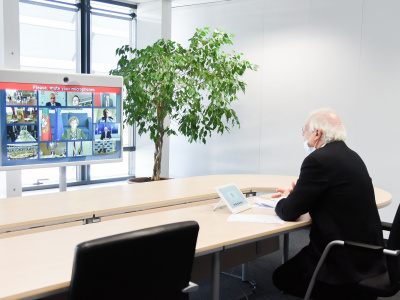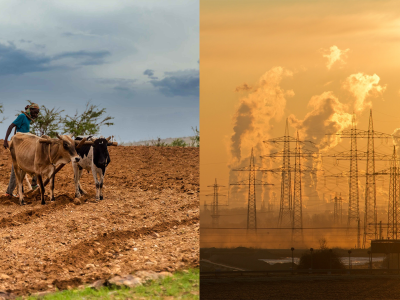
Africa’s industrialisation is not a choice, it is an imperative!
What's on this page
The 6th Joint United Nations Economic Commission for Africa-African Union Commission meeting of Finance, Planning and Development Ministers met in Abidjan on the 25th and 26th of March. Intensive discussions emphasised the imperative to reverse the economic quagmire of the past decades by focusing on industrialisation as a necessary path towards sustained wealth creation for an emerging Africa. This is a not an option, it is a must if the continent wants to pass the litmus test of successful, sustainable and inclusive structural transformation and drive its population, once and for all, out of the economic and social misery in which it has been trapped for almost half a century. As Africa celebrates its 50th anniversary of African unity this year, a strong consensus is emerging: it’s time for Africa to shape its destiny with its own resources, in the way that it finds fit and above all, in a way that fits the interests of its people. On the economic side, the major challenge remains translating the windfalls of the good economic performance of the past decade (despite the setbacks of the global crisis) into real development outcomes. African policy makers all agree that what is needed is an ambitious structural transformation of the economy, not a new set of structural adjustment programmes, which has proved very damaging in the past. And this will only be done through focused and strong industrialisation. The abundant commodity base of many countries presents a formidable opportunity as it provides the foundation to fuel the engine of growth. The Economic Report on Africa 2013 launched at the Abidjan meeting makes the case for this.
But what’s different now?
Political posturing: the political signals coming from different sides of the continent are very strong. With the changing geopolitics and the recalibrating of priorities on African interests, policy makers are increasingly taking ownership of their development to do it the African way. Accountability: politicians have got the message. If they want to make it through the polls again, they have to work for their people. This is even more so in resource-rich countries, where it becomes more and more intolerable for the population to watch their rich endowments flow out of their soil to the profit of others, while that hardly see the benefits trickle down. Economic prospects: Africa is the last frontier of untapped potential. Countries have been quickly catching up and Africa is affirming itself rightfully as a continent where opportunities are flourishing. And this is more than just hype. The rising middle class is undoubtedly providing numerous prospects. Improving governance has increased the credibility capital of many countries. And better macroeconomic stability has made businessmen more confident. Governments: are back on the stage, with strong determination and political will to define and support the industrial and trade strategies needed in their specific contexts. They are not there to pick winners, but rather to drive policy decisions and provide the necessary support to their businesses so that they can plug into regional and global value chains. Let’s be clear, this will require strong leadership, bold vision, focused strategies and fundamental changes in mindsets and in the parameters of the way Africa has been conducting its affairs so far. Failures of past economic policies and historical and political legacies leave no room for inaction. In addition, a number of challenges remain: the infrastructure divide is still too wide; the business climate and regulatory environment need fixes to reduce the cost of doing business and to foster entrepreneurship and trigger innovation; and trade barriers need to be addressed, both within the continent and in other markets. The strong call of a new Africa creates high expectations on delivering.What do we expect now?
Successful industrialisation requires audacious entrepreneurs that are willing to take up the challenge. For this, it is important not only to have a conducive regulatory environment and an attractive business climate, but also strong incentives that will encourage and support innovation, entrepreneurship and creativity. This requires a whole range of guarantees for entrepreneurs, including strong intellectual property rights, which is currently a weak link on the continent. The issue of financing is also key. The recent financial crisis has shown the limits of Official Development Assistance as traditional donors face the reality of shrinking development assistance. But looking at Africa’s own financial capacities, ODA is no longer the main source of finance (total ODA inflows, excluding debt relief, totalled $50 billion in 2011). Thanks to its rich resources, many African countries have become less dependent on development assistance. For instance, savings in sovereign wealth funds of hydrocarbon-rich countries were estimated at US$114.3 billion in 2009. Similarly, the World Bank estimates that remittances from the diaspora will reach $60 billion in 2014. In addition, many countries have large foreign exchange reserves, which are currently invested in treasury bills abroad for low interest rates. Many are well rated and can leverage funds on international markets at attractive rates. Fighting capital flight, estimated at $202.4 billion for the period 2005-2010 for Sub-Saharan African, is another potential source of finance for the continent. Countries’ can also count on their capacity to leverage financing on international markets and the role that public-private partnerships could play to finance some of the important development projects. Countries cannot go it alone. Globalisation has taught us that countries are increasingly inter-dependent, hence the need for strong regional policies, including on regional value chains and product spaces, where countries can find synergies and complement each other. And Africa will not retreat into isolation. Partnerships with other countries will be inevitable, although we can expect different dynamics. Working with external partners will necessitate a paradigm shift in mindsets The challenge for Africa now will be to avoid falling in the rhetoric trap. It has raised the bar and expectations are high. As President Alassane Ouattara said when he opened the meeting in Abidjan: “we can do more and better”. Now the time has come to translate words into action, and quickly. -- Isabelle Ramdoo is Policy Officer Trade and Economic Governance, ECDPM. This blog post features the author’s personal views and does not represent the view of ECDPM.
Loading Conversation

